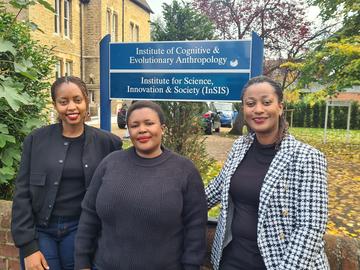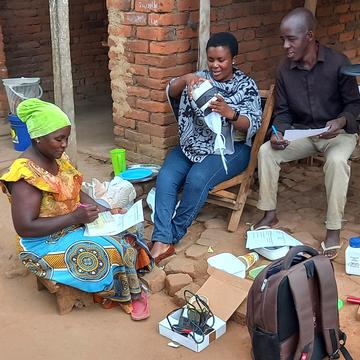Working together to tackle malaria: InSIS hosts social scientists from the Ifakara Health Institute in Tanzania
The Institute for Science Information and Society (InSIS) at the School of Anthropology and Museum Ethnography recently welcomed three visiting social scientists from the Ifakara Health Institute in Tanzania.

(From left) Naomi Urio, Winifrida Mponzi, and Irene Moshi
Irene Moshi, Winifrida Mponzi and Naomi Urio all work on the social dimensions of malaria prevention and control in sub-Saharan Africa. In Oxford they are collaborating with Javier Lezaun and Ann Kelly on the design of more effective strategies to prevent malaria and other vector-borne diseases.
The Ifakara Health Institute (IHI) is a leading health and environmental research organisation in Africa focused on developing, testing and validating innovations for health. Its work spans a broad range of public health issues such as malaria, HIV, TB, maternal and child health and nutrition, and neglected tropical diseases. IHI encompasses a broad range of scientific disciplines, spanning from biomedical and clinical trials, environmental and ecological sciences, health systems research, intervention, impact evaluation and policy engagement, and health program implementation.
Malaria is endemic in Tanzania, and the Kilombero Valley around the town Ifakara has historically been severely affected. Over the last 20 years, however, malaria incidence has been successfully reduced through a range of interventions pioneered by IHI.
“To make a meaningful impact on people’s health, we need to understand which interventions work in which communities, how they interact with health and social systems, their effectiveness and how to introduce them so people recognize and adopt their benefits.” Irene Moshi
Irene, Winifrida and Naomi are working on a variety of projects encompassing technological innovations for disease prevention, from changes in agricultural practices that would reduce mosquito resistance to insecticides, to community-based solutions to finance the house improvements necessary to reduce exposure to mosquitoes, or the development of subnational malaria control strategies in Tanzania. The diversity of projects at IHI reflects the fact that there is no one single solution to a complex public health challenge like malaria. Social scientists play a crucial role in any innovation being adopted in a community.

Community members were trained to trap, identify, and record mosquitoes as part of a citizen-science project verified by scientists.
Irene Moshi said: “To make a meaningful impact on people’s health, we need to understand which interventions work in which communities, how they interact with health and social systems, their effectiveness and how to introduce them so people recognize and adopt their benefits. These are all questions that we as social scientists seek to address.”
Over the last decades IHI has nurtured the careers of many health scientists. Irene, for example, joined the Institute as a research officer in 2012, and has since participated in many research projects, from work on maternal and child health, to the field evaluation of new medicines and insecticides, or the design of better interfaces between science and policy in Tanzania.
A Junior Research Scientist, Naomi Urio began her career with a Masters in Public Health Research at IHI and has recently began a PhD in Infectious Diseases at the University of Glasgow to explore the conditions and strategies necessary for the sustainable elimination of dominant malaria vectors.
Winifrida Mponzi first became involved in malaria research through her experience in entrepreneurship, working on a project with IHI to design and test mosquito-repellent sandals. She has since collaborated with researchers at Oxford on the use of mobile phone app for the identification of different Anopheles mosquito species. Winifrida has now started a PhD to build on her work on community-based microfinance for house improvements that would better protect people from mosquito bites.
"Mosquito-borne diseases like malaria are entangled with all sorts of social and economic issues. All interventions need social science research to be effective and durable.” Javier Lezaun
During their time at Oxford the researchers are collaborating with Ann Kelly and Javier Lezaun at InSIS on new tools and methods from the social sciences to address mosquito-borne diseases, including malaria as well as Zika and dengue.
Javier Lezaun, Director of InSIS said: “We are delighted to have Irene, Winfrida and Naomi visiting from the Ifakara Health Institute, a cherished partner institution for many years. It is a great opportunity to exchange ideas and collaborate on the development of new social science tools and concepts to address public health challenges. Mosquito-borne diseases like malaria are entangled with all sorts of social and economic issues. All interventions need social science research to be effective and durable.”
The visit came about through INOVEC, a EU- and UKRI-funded consortium dedicated to fostering collaboration and innovation for the control of mosquito vectors of disease.


